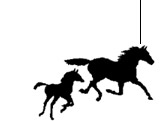|
Quarter horses born for slaughter
An article by John Holland
Link to article
Holland, of Shawsville, is a freelance writer, author of three books and senior analyst for Americans Against Horse Slaughter.
In the aftermath of Black Monday, most of us felt like Baghdad citizens after "shock and awe." Stunned and disoriented, we sifted through our portfolios looking for anything salvageable.
But while lesser politicians were distracted by the proposed bailout, Rep. Bob Goodlatte was not. He knew what needed to be done and how to do it. Hundreds of thousands of dollars were at stake and time was critical. H.R. 6598 had to be stopped.
Goodlatte, now in his eighth term, might never have gained the skills he now employed had he not made the pragmatic decision to ignore his original campaign promise to limit himself to six terms, or his prophetic warning of the corrosive process that befalls anyone who stays in Congress longer.
H.R. 6598, The Prevention of Equine Cruelty Act, had to be delayed in the Judiciary Committee before it could reach the House floor for a vote. Within hours, horse rescues around the country began posting about strange calls from unassigned telephone numbers in the bowels of the House office buildings.
The callers were asking how many horses the rescue could currently accept. If asked how many horses the caller had, or any other probative question, the callers would simply hang up.
H.R. 6598 was a last-minute attempt by horse slaughter opponents to do an end run through the Judiciary Committee. Goodlatte and the ranking members of the House Agriculture and Commerce committees had managed to bottle up a similar bill (H.R. 503) in their committees.
The Senate version of that bill (S. 311) was reported out of committee last year but was blocked on the Senate floor by Goodlatte's stalwart pro-slaughter ally, Sen. Larry Craig of Idaho. Like Goodlatte, Craig had demonstrated the good sense to forget a promise: to resign after his unfortunate arrest in the Minneapolis Airport men's room affair.
With formidable resolve, Craig refused to surrender his seat even after being admonished by the Senate Ethics Committee for illegally using his campaign coffers to mount a legal challenge to his own guilty plea in that incident. It is such politicians who have bequeathed to our Congress its coveted 15 percent approval rating.
Goodlatte used his seat on the Judiciary Committee to fulfill his sacred obligation to old compatriots, like his former Agriculture Committee minority leader Charles Stenholm, and his former aide Brent Gattis, who left his side to work as pro-slaughter lobbyists for the firm of Olson, Frank and Weeda.
In 2007, the last three horse slaughter plants in the U.S. were closed by state laws in Texas and Illinois, but the industry quickly shifted its operations to Canada and Mexico. The slaughter of American horses actually increased, but the victory for anti-slaughter proponents sent shock waves through the pro-slaughter community.
There loomed the possibility of a crisis of faith among the horse slaughter lobbyists. Professionals like Goodlatte and Craig realized that such a crisis might ripple through the entire system, causing untold financial devastation.
Goodlatte has long enjoyed the largesse of horse slaughter supporters like the American Quarter Horse Association. No breed is more prominently represented in the slaughter trucks rolling toward Canada and Mexico than the quarter horse. A unique American breed with a muscular rump, it is both the unchallenged denizen of rodeos and a highly prized menu selection among European horsemeat gourmets.
The AQHA and Goodlatte have long dismissed the assertion that the AQHA defended horse slaughter because it needs the registration fees on foals for their bottom line. Like Goodlatte, it continually insists that there are excess horses and slaughter is the only answer.
By meeting time, Goodlatte had his survey. Claiming that rescues could accept only 7,000 of the more than 100,000 horses sent to slaughter each year, Goodlatte skillfully consumed the allotted time for considering H.R. 6598. No matter that the survey was a farce, the tactic was successful and the bill was once again delayed.
The following Tuesday the committee finally reported the bill out over Goodlatte's warning that if it passed, unwanted horses would starve, creating a buzzard epidemic. But the delays all but guaranteed it would not pass.
Bill Brewer, AQHA executive, demonstrated the hyperbolic hypocrisy of their excess-horse excuse in his 2008 AQHA convention speech. Reveling in their earnings, he declared not that there were too many horses in America, but that "our challenge becomes looking at ways to introduce an equine economic stimulus package that will boost registration numbers so we don't have a horse shortage in a few years."
"Help us lead Canada's horses away from barbarism . .
and into the protected pastures of a civilized
nation."
|


